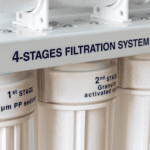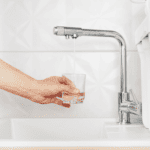Shower water with a metallic smell can be both alarming and off-putting. There are a few reasons why this might occur, and it is essential to identify the root cause in order to effectively address the issue. One common reason for a metallic smell in shower water is the presence of dissolved minerals such as iron, manganese, and zinc found within the water supply. As groundwater moves through rocks and sediments, these minerals can get picked up and make their way into your water.
The plumbing system of your home may also play a role in your shower water’s metallic smell. Older pipes can break down and leach metal into the water, creating a potential for contamination. In some cases, corroding pipes can even affect the overall water quality. It’s important to not only address this smell but also be aware of any potential health risks associated with prolonged exposure to water containing high concentrations of metallic minerals.
Key Takeaways
- Metallic smell in shower water can be caused by dissolved minerals like iron, manganese, and zinc.
- The plumbing system of your home may also contribute to the metallic smell in shower water.
- Resolving this issue not only eliminates the odor, but is also important for health and safety.
Understanding the Root Causes
Water Source
One key factor that can contribute to the metallic smell in your shower water is the water source itself. Groundwater is more likely to have a metallic smell than surface water, as it moves through rocks and sediments that can make their way into the water supply. In some cases, the surrounding soil and rocks may be rich in dissolved minerals, such as iron, manganese, and zinc, which can give your water a metallic scent and taste ^(source). If you have a well, the infrastructure used to channel and hold well water may be corroded, causing a metal smell in the water. The best way to fix this issue is to replace the old plumbing ^(source).
Metal Contaminants
Various metal contaminants present in the water supply can cause your shower water to smell like metal. Some of the common metal contaminants include iron, copper, lead, manganese, and zinc. Corroded pipes or plumbing fixtures may be a significant source of such contaminants ^(source).
To address these metal contaminants, different treatments can be applied depending on the specific contaminant at hand. Here are some common treatments for metal contaminants:
- Iron treatment
- Manganese treatment
- Copper treatment
- Zinc treatment
In addition to these treatments, addressing low pH levels in the water can help alleviate the issue ^(source). Monitoring and maintaining the quality of your water source is essential to ensure a metal-free shower experience.
In conclusion, understanding the root causes of the metallic smell in your shower water and taking appropriate actions to address them will help ensure a pleasant and safe shower experience.

Role of Plumbing System
Galvanized Steel Pipes
Galvanized steel pipes were popular in plumbing systems before the 1960s. While these pipes offer a protective zinc coating to prevent rusting, over time, the zinc can wear away, exposing the iron inside the pipes. This can lead to corrosion, which may cause the metallic smell in your shower water. Additionally, minerals such as iron, manganese, and zinc might dissolve from the surrounding soil and rocks, as well as corroded pipes, and contribute to the metal smell in your water.
Corroded Pipes
Corrosion is the chemical reaction that occurs between the pipe material, water, and other elements. In plumbing systems, corroded pipes can release metal particles into the water supply, causing an unpleasant metallic odor in the shower water. Factors that accelerate the corrosion process include high water temperature, high acidity levels, and increased levels of dissolved oxygen in water. If you suspect that corroded pipes are the primary reason for the metallic smell in your shower water, we recommend inspecting your plumbing system and tightening any corroded joints or replacing sections of pipe that might be causing the issue.
Rusted Pipes
Rusted pipes refer to pipes that have undergone oxidation, causing their surface to become brittle and flaky. This process can eventually lead to pipe failure, causing leaks and water damage. When rusted pipes are part of your plumbing system, the rust particles can easily mix with your shower water, creating an unpleasant metallic odor. If you are aware of rusted pipes in your home, it is essential to address this issue immediately to prevent further damage to your plumbing system and maintain the quality of your shower water.
By keeping an eye on the condition of your plumbing system, particularly galvanized steel, corroded, and rusted pipes, we can address potential issues early on and ensure you enjoy a fresh and clean shower experience.

Influence of Water Quality
City Water
City water, which is treated and regulated by local municipalities, can sometimes have a metallic smell due to dissolved minerals such as iron, manganese, and zinc. These minerals can originate from the surrounding soil and rocks or corroded pipes and plumbing fixtures1. It’s essential to monitor the water quality and ensure it meets acceptable pH levels and regulatory standards to maintain a safe and pleasant-smelling water supply at home.
Well Water
Well water is more susceptible to having a metallic smell compared to city water, as it moves through rocks and sediments that introduce metallic minerals into the supply2. Iron, copper, and zinc are some of the common minerals that cause well water to smell like metal. In most cases, the smell can be linked to dated residential infrastructure, such as corroded pipes, fittings, and tanks3. Regular testing and maintenance of well water systems is crucial to ensure the water quality remains safe to use.
Tap Water
Tap water quality can be influenced by both city water and well water sources, depending on where it accesses its supply. Similar to the other sources, tap water can also contain dissolved metallic minerals, such as iron, copper, or manganese, which cause the water to smell like metal1. In some cases, the smell might be due to bacterial activity, especially if the odor is more like rotten eggs or sewage4. Regular inspection of your home plumbing system and proper sanitization procedures can help maintain the quality and smell of tap water. This allows us to provide safe and clean water to our families and communities.
Health Risks Associated
Anemia
Water that smells metallic may contain high levels of iron, which can lead to anemia. We know that iron is an essential nutrient that our body requires for producing red blood cells and maintaining good health. However, too much iron in the water can interfere with the absorption of other essential nutrients, such as zinc and copper, resulting in anemia. Anemia is characterized by fatigue, weakness, and shortness of breath, as the body struggles to provide enough oxygen to its cells.
Hypertension
Another concern of metallic smelling shower water is the possible presence of lead. When lead accumulates in the body, it can cause lead poisoning, which may result in hypertension or high blood pressure. Hypertension is a significant risk factor for heart disease and stroke. A study has shown that exposure to even low levels of lead can increase the risk of hypertension, especially in people with pre-existing conditions or a family history of the disorder.
Kidney Disease
Heavy metal contamination, such as from copper, manganese, or zinc, can also adversely affect our health. Prolonged exposure to high levels of these metals has been linked to kidney disease. Over time, the accumulation of these metals in the kidneys can damage the filtering units responsible for removing waste products from the blood, ultimately leading to kidney dysfunction and even kidney failure.
In conclusion, it is essential to identify the cause of a metallic smell in your shower water and address it to avoid potential health risks.
Signs of Metallic Water
Smelly Shower
When we encounter a smelly shower, it can be quite bothersome. There are various factors that can cause a metallic smell in our shower water. One possible reason is the presence of dissolved minerals like iron, manganese, and zinc in the water. These minerals can originate from surrounding soil and rocks, corroded pipes, or even the water treatment process itself. Another potential reason for a metallic odor in our shower water is when our pipes, especially those made of iron, lead, or other metals, become old and rusty. In such cases, it is essential to check the plumbing system and consider replacing old pipes if necessary.
Metallic Taste
Alongside the metallic smell, we may also experience a metallic taste in our water. This taste can be attributed to the presence of minerals such as iron, copper, lead, manganese, and zinc. Groundwater can be more likely to have a metallic taste than surface water, as it moves through rocks and sediments that can introduce these minerals into the water supply.
Various treatments can help address the issue of metallic water taste, including iron, manganese, copper, zinc, and lead treatments, among others. It is important for us to first determine whether the metallic taste is a new condition or an ongoing issue, as well as whether our water supply comes from a well or a public source. To tackle a metallic water taste effectively, it might be helpful to consult a water treatment professional to determine the best course of action based on our specific situation.
Water Treatment Solutions
There are various water treatment solutions available to address the issue of metallic smelling shower water. In this section, we will discuss three popular solutions: Water Softeners, Filtration Systems, and Reverse Osmosis Systems.
Water Softeners
Water softeners are designed to eliminate or reduce the hardness of water due to an excessive amount of minerals, such as calcium and magnesium. By removing these minerals, water softeners help prevent the buildup of scale in plumbing systems, which can contribute to a metallic smell in shower water. Additionally, softer water may prevent metal ions like iron and zinc from attaching themselves to your pipes, thus reducing metallic smell.
When selecting a water softener, it’s essential to choose the right size and type, considering factors such as water hardness, usage requirements, and available space for installation. We recommend consulting a water treatment professional to ensure the best solution for your needs.
Filtration Systems
Water filtration systems work to remove harmful contaminants and impurities, such as metals, from your water supply. There are various types of water filters, including activated carbon filters, sediment filters, and showerhead filters.
Activated carbon filters are designed to remove impurities by adsorption, through which contaminants are trapped within the pores of the filter. Sediment filters, on the other hand, remove larger particles such as sand, rust, and silt. Showerhead filters specifically target shower water, removing impurities directly at the point of use.
In order to choose the most appropriate water filtration system, it’s important to analyze your water quality and identify the specific contaminants present. This information can then be used to select a filter that targets those specific contaminants, ensuring effective treatment.
Reverse Osmosis Systems
Reverse osmosis (RO) systems provide one of the most comprehensive forms of water treatment available. RO systems use a semipermeable membrane to filter out contaminants, including metals, allowing only pure water to pass through.
Reverse osmosis systems can remove a wide range of contaminants, including those responsible for metallic smelling water. They are typically installed at the point of use or as a whole-house system to treat all water entering your home.
One important consideration when choosing a reverse osmosis system is the amount of wastewater generated during the filtration process. Since reverse osmosis is a highly efficient method of water treatment, it can produce a significant amount of wastewater. However, modern RO systems often include water-saving features that help minimize this issue.
In conclusion, addressing metallic smelling shower water requires careful evaluation of your water quality and specific contaminant issues. By selecting the appropriate water treatment solution, you can effectively improve the quality and safety of your water supply.
Maintenance and Prevention Tips
To keep your shower water smelling fresh and free from any metallic odors, it’s important to diligently maintain and prevent common causes of these issues. In this section, we’ll share several tips to help make sure your shower water stays clean and smells pleasant.
First, regularly clean your showerhead and any faucet aerators. This practice helps to remove any buildup of minerals or metals in the nozzles. Soaking the showerhead in vinegar is an effective method to clean it, as the acidity helps to dissolve the unwanted deposits.
Next, consider testing the pH levels of your water. Acidic water, or water with a low pH, can lead to corrosion in your pipes, causing a metallic smell or taste. Installing a pH neutralizer can help balance the water’s acidity and prevent further damage.
Addressing hard water issues can also help prevent metallic odors. Hard water contains high amounts of minerals, such as calcium and magnesium, which can mix with the dissolved metals like iron and manganese in your water. Installing a water softener can reduce the hardness of your water, minimizing the chances of metallic smells.
In addition, flushing your water heater can help prevent the buildup of minerals and metals, which can contribute to unpleasant odors. We recommend performing this maintenance task at least once a year to keep your water heater working efficiently.
Finally, it’s useful to routinely inspect your plumbing system for any signs of corrosion or damage. If you find any issues, address them promptly to avoid potential leaks, which can cause the metallic smell in your water.
By following these maintenance and prevention tips, we can ensure our shower water remains clean and free from unwanted metallic smells.
When to Consult a Professional
If you’ve noticed that your shower water smells like metal, it’s essential to identify the cause and address the issue. In some cases, you can resolve the problem by taking simple steps, such as cleaning your fixtures or flushing your water heater. However, we recommend consulting a professional in the following situations.
When the metallic smell persists despite your efforts, it could indicate an issue with your home’s plumbing system or the distribution system supplying water to your home. Professionals can effectively assess and identify potential problems within these systems, ensuring a proper resolution.
Another reason to consult a professional is if you suspect the issue is related to your water heater. Water heaters can sometimes accumulate sediment and minerals, leading to a metallic smell in your shower water. Experts can safely inspect, clean, and maintain your water heater to prevent any further issues.
If you’ve recently moved into a new home, it’s wise to have your water tested to determine the quality and safety of your water supply. An EPA-certified testing laboratory can accurately test your water for harmful contaminants, such as lead, copper, or other metallic minerals. This information can help you make informed decisions about necessary water treatment options.
Finally, if the metallic smell is also accompanied by discoloration or an unpleasant taste, it’s essential to seek professional help immediately. These signs could indicate the presence of potentially harmful contaminants in your water supply that require prompt attention and remediation.
Frequently Asked Questions
What causes the metallic smell in shower water?
The metallic smell in shower water is often caused by the presence of minerals, such as iron, manganese, and zinc, in the water supply. These minerals can originate from various sources, including surrounding soil and rocks, corroded pipes or plumbing fixtures, or the water treatment process itself source.
How can I remove the metal odor from my shower?
To remove the metal odor from your shower, you can try using a water filter specifically designed to remove the minerals that cause the metallic smell. Additionally, maintaining your plumbing system, such as replacing old and corroded pipes, may help reduce the metal odor in your shower water.
Is showering in water with a metallic smell safe?
Showering in water with a metallic smell is generally considered safe. However, certain minerals, such as lead, can pose health risks when present in high concentrations. If you are concerned about the safety of your shower water, consider having your water tested by a professional to determine the exact mineral content and whether any action is needed.
Can water softeners cause a metal smell?
Water softeners are designed to remove hard minerals like calcium and magnesium from the water supply but typically do not cause a metal smell in the water. However, if a water softener is not functioning properly or has been contaminated, it could potentially contribute to a metallic smell in your water source.
Why is there a sudden change in my water’s taste and smell?
A sudden change in your water’s taste and smell could be due to changes in the levels of minerals such as iron and manganese source. It could also be a result of issues with your plumbing system, like corroded pipes, or changes in the water treatment process. If you’ve noticed a sudden change in your water’s taste and smell, it’s a good idea to have your water tested to identify the cause and determine if any action is needed.
Does a metallic taste in water indicate a health risk?
A metallic taste in water does not always indicate a health risk. Often, it’s simply the result of mineral content in the water. However, if certain minerals, like lead, are present in high concentrations, they could pose a health risk. If you are concerned about the metallic taste in your water, consider having your water tested by a professional to determine the exact mineral content and whether any action is needed.









